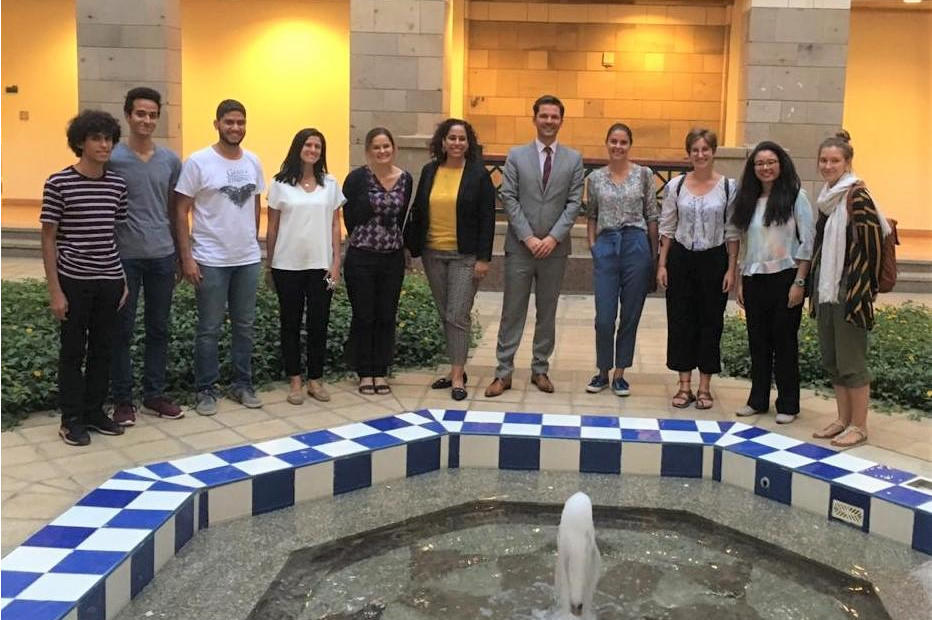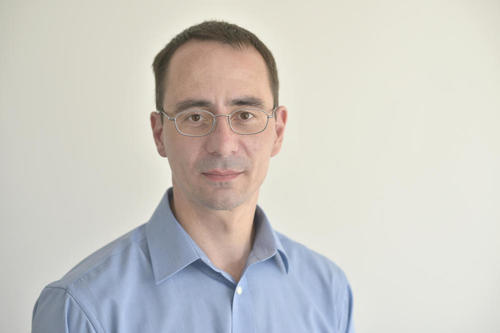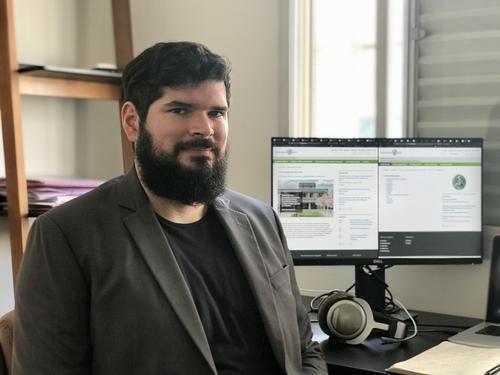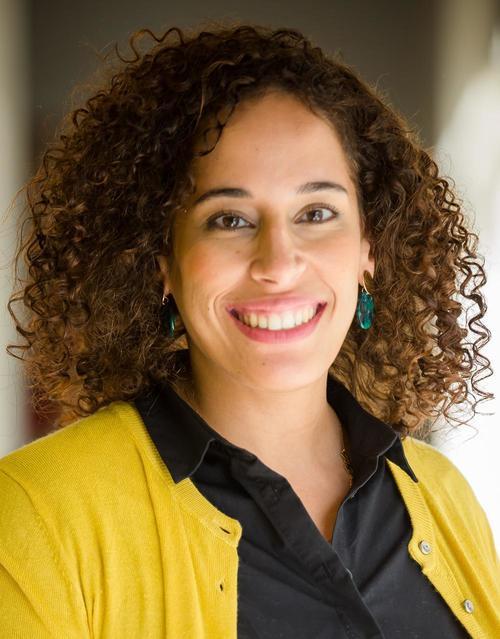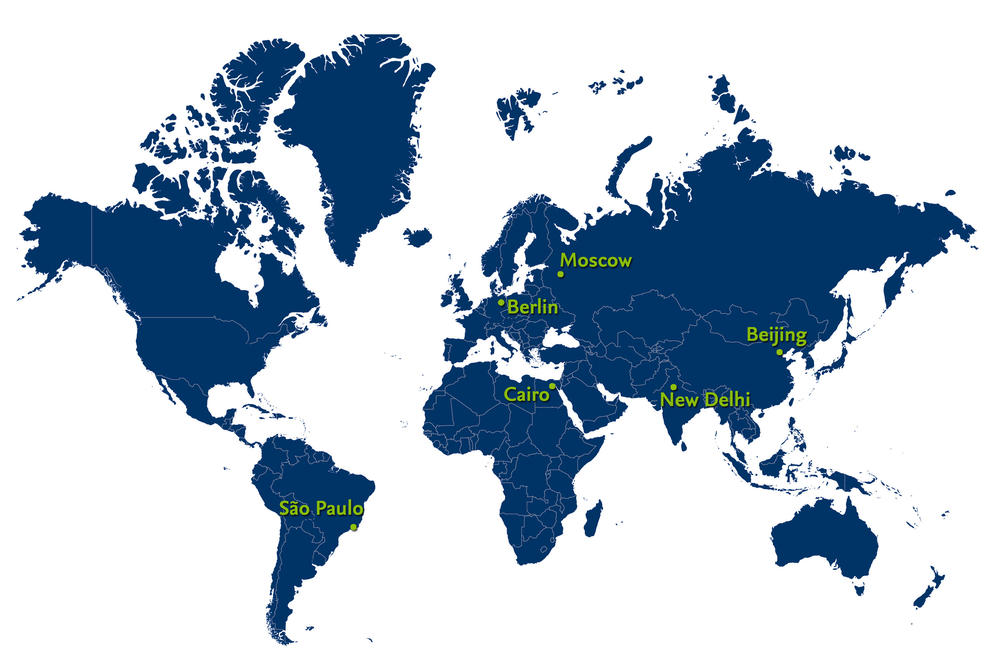On Site and Yet Digital
The Freie Universität Liaison Office Directors in Cairo, Moscow, and São Paulo on the situation during the coronavirus pandemic / campus.leben interview
May 26, 2021
Liaison work for Hoda El Mahgoub (6th from left) before the pandemic: Steffen Krach, State Secretary for Higher Education and Research, visited the American University in Cairo in October 2019 and met with exchange students from the U.S. and Berlin.
Image Credit: Personal collection
Freie Universität maintains a worldwide network of liaison offices in Cairo, New Delhi, Moscow, Beijing, and São Paulo. The staff members working in these locations support scholars in international networking, raise awareness of Freie Universität Berlin in the target regions, and promote research cooperation and exchange programs. The directors of the international offices have a special connection to the respective country, speak the language, and have expertise in the regional scientific landscape. But what remains of this home advantage in times of pandemics, lockdowns, and home offices? A campus.leben interview with the liaison office manager in Cairo and the office managers in Moscow and São Paulo.
Mr. Stüdemann, how is the liaison office work in Moscow going at the moment?
Tobias Stüdemann: I attend video meetings, like right now. The pandemic has changed my work a lot, as it has for most people. As a representative of Freie Universität abroad, I had to adjust quite a bit. My actual task – connecting people from Germany and Russia – only works to a limited extent online. That’s because it involves building trust, which is difficult when you only get to know each other through a computer screen. Online meetings are usually strictly planned, with time constraints and an agenda. In real meetings, however, the breaks are almost more important to me than the agenda items; new contacts and projects often emerge during small talk.
I also unfortunately had to postpone a planned business trip to Uzbekistan. However, in order to build connections with new universities, I need to get a feel for the region and how knowledge is experienced; otherwise it is difficult to understand our future partners. That is why I am currently focusing on existing collaborations and trying to develop them further.
Christian Lazar has been in his home office in São Paulo since taking up his duties as liaison office manager there.
Image Credit: private
Mr. Lazar, do you feel the same way in São Paulo?
Christian Lazar: Yes, unfortunately. Unexpected encounters and chance meetings are also important for networking in South America. In my case, there is also the fact that I have only been the liaison office manager since last summer. Unfortunately, I have not yet been able to travel to Freie Universität to introduce myself to the academic departments and administrative divisions. Fortunately, I know the university from my own student days.
Through my previous jobs in São Paulo, I am familiar with the metropolis and know many local partners, at least outside the current state of emergency.
At the moment, my focus is on providing individual advice to scholars and students from Latin America. Many people still want to research, teach, or study at Freie Universität. For current research work, some professors at Freie Universität have also requested information about the current situation in Brazil. Here I was able to help with my local expertise.
Ms. El Mahgoub, what does your day-to-day work in Cairo look like?
Hoda El Mahgoub: It’s not easy for me either to initiate new projects in online formats. But on the other hand, digitization makes a lot of things easier. Organizational matters can be discussed quickly in spontaneous video meetings instead of having to write dozens of emails. Collaborations in teaching and research are possible without air travel and bureaucratic visa requirements.
We were able to virtually implement almost everything that was planned before the pandemic. It is nice that, for example, colleagues from the entire Middle East and North Africa region, and also from Berlin, were able to participate in a workshop that was planned in Egypt.
Are you also experiencing these positive effects in Brazil and Russia?
Christian Lazar: Everyone has become proficient in video meetings, and appointments are no big deal; this has also made it easier for me to learn the ropes in my new position.
Small talk, however, seems strange over the camera and at a distance, especially if you’ve never met before. People are also overrun with digital conferences and want to keep things as short as possible. So it’s hard to build trust, but easy to reach many people in different locations.
Tobias Stüdemann: We’ve been successfully using online formats since 2016, so there are well-rehearsed processes we were able to build on. Over the past few months, I’ve been training in camera, sound, and lighting technology and equipping the office to improve the quality of digital formats.
Since there were no more local appointments and long travel routes were eliminated, I had the opportunity to research the current situation in Russia. This is important in such a politically eventful time, in which, for example, human rights and academic freedom are being curtailed. Although I am in my home office, I am still on the ground and can report from a university perspective. This is certainly more difficult from a distance and without numerous familiar contacts in different places.
How do you experience the Russian government’s handling of Covid-19?
Tobias Stüdemann: What we hear from the Russian media about crisis management is contradictory. According to current figures (as of March 26, 2021), there are currently 4.1 million infected and recovered people, supposedly only 95,000 deceased, but an excess mortality of around 300,000 people in 2020. Statistically, this cannot be true; clearly this is misinformation, but there are simply no other figures.
As is often done here in exceptional situations, central institutions transfer responsibility to the regions. Each governor issues his own regulations, but must deliver results.
In Moscow, there was no classic lockdown, but there were “work-free days” so that legally no money had to be paid out to the needy and affected. Schools and universities were in online mode. People were only allowed to move within a narrow kilometer radius of their homes for necessary errands in the first few months; they were not even permitted to go for a walk or jog. Permission had to be obtained for longer trips. Since the summer, masks and gloves have been mandatory in public, but stores and restaurants have reopened.
The new semester started at the beginning of February, and now there are officially complete face-to-face classes again, interrupted by selective quarantines for individual student groups if necessary. Previously, the respective financial situation determined who could attend. If you didn’t have a laptop or smartphone, you couldn’t study. The social differences, the overall economic situation and the combination of Covid skepticism and pandemic fatigue is very problematic, and the consequences, as everywhere, are not yet foreseeable.
What is the current situation in Egypt?
Hoda El Mahgoub: The Covid cases are kept within limits here, at least officially, but the numbers are probably also kept artificially low here. Outside Cairo, there is hardly any information on the situation, because there is hardly any testing. The country is therefore relaxed, schools have reopened under hygiene regulations, and tourists are welcome.
Like me, however, many employees have been working from home for a year. At the universities, most events are held digitally. However, they are currently considering offering face-to-face courses again. Students from Berlin are still welcome to apply for stays abroad; one student was also with us in the winter semester.
Mr. Lazar, have you been able to move into your office at the German House of Science and Innovation?
Christian Lazar: I’ve been there a few times to pick up documents, but actually all the employees in the building have been in their home offices for eleven months. That’s not going to change anytime soon. The situation surrounding the pandemic remains tense, and there is talk of a second wave, although the number of cases in the first wave has not actually subsided. After all, Brazil is 80 percent the size of the entire European Union. The incidence of infection in the various states is therefore very different.
In São Paulo, the situation remains critical. The inconsistent lockdowns have not worked, yet the economic damage is huge and many people are unemployed. It is now difficult for politicians to justify another hard lockdown, especially because the social safety net is so weak.
The public schools in the city have been closed for a year. The University of São Paulo is in a good financial position and has distributed laptops to needy students. However, it is only one of a few universities in the country that has managed to maintain regular digital teaching.
The great advantage of having a liaison office on the ground is that we can report firsthand on these events. At the moment, there are only a few rare exceptions where it would make sense for students and researchers from Berlin to come to Brazil.
Do you confer with each other to discuss liaison office work in times of crisis?
Tobias Stüdemann: Yes, we met online just recently. For example, we talk about topics such as sustainable mobility and discuss the extent to which a digital stay abroad can be a good addition. The consensus is that this can be useful if it is a short summer school or conference.
But we also agree that online alternatives cannot replace the on-the-ground experiences that students and scholars can have abroad.
This interview was conducted by Jennifer Gaschler.
This article originally appeared in German on May 5, 2021, in campus.leben, the online magazine of Freie Universität Berlin.
Further Information
Freie Universität Berlin currently maintains liaison offices in Egypt, Brazil, China, India, and Russia. Due to the pandemic, the management of the offices in China and India is currently being taken over on an interim basis from Berlin and New Delhi, respectively, until a replacement is possible again.

